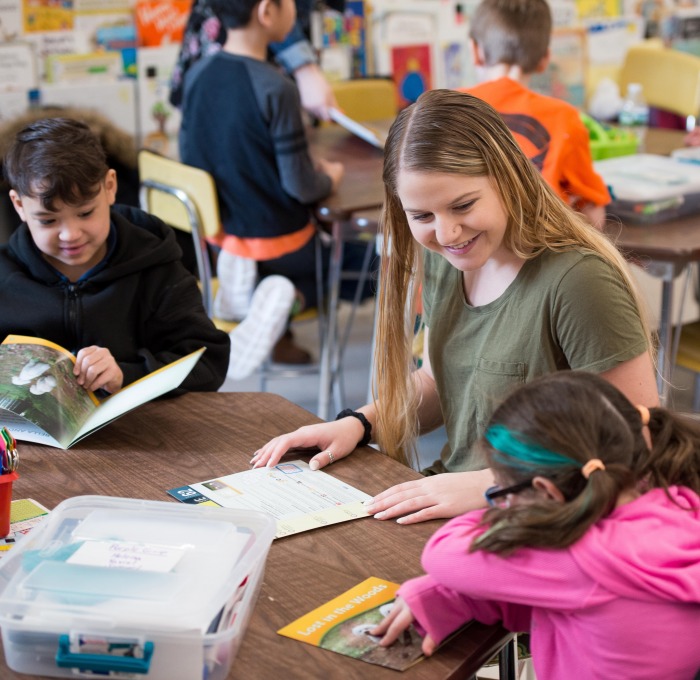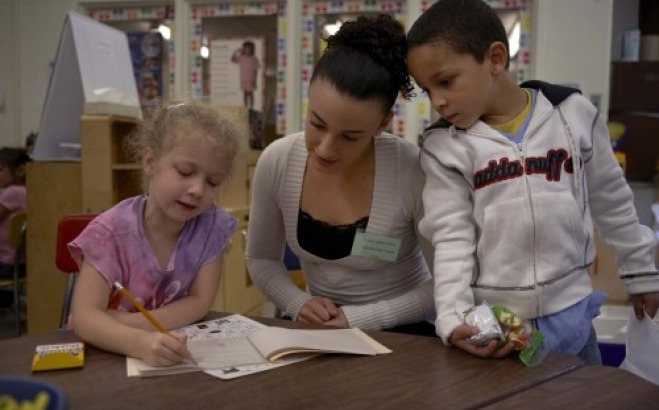
In Short
Become a catalyst for change as a special education teacher and help to increase opportunities in education and improve outcomes for children with severe disabilities.
Program Overview
Students within the special education severe disabilities concentration may pursue initial teacher licensure as a teacher of students with severe disabilities (all levels) by completing a special education major. In this concentration, students will learn the theory, research, and pedagogy necessary to teach students with severe disabilities through the special education major and develop interdisciplinary studies content knowledge through their general education coursework.
Throughout the program of study, students will complete several field-based experiences in special education and regular education inclusive settings, which will be supervised by mentor teachers and university faculty supervisors. These field-based experiences will provide students with opportunities to observe and participate in classroom instruction that incorporates what students are learning in their educational pedagogy classes as well as what students are learning in their general education courses. Students will complete a formal practicum for their special education severe disabilities major. This program meets the standards of the Council for the Accreditation of Educator Preparation.
Education 4+1 Program
Complete a 4 Year Bachelor’s Degree and License in... Severe Disabilities, All Levels
Complete a 1 year M.Ed. in Pedagogy and Learning and add a License in... Moderate Disabilities, PreK-8 OR 5-12
- Guaranteed admission into the graduate program for students who maintain their academic standing and meet admission qualifications.
- Students must pass all required MTELs and successfully complete the practicum in order to earn the initial license. This will automatically make them eligible for the 4+1 program.
- Students in this program can begin their graduate coursework in the semester immediately following completion of their bachelor's degree and have a seamless transition from their undergraduate to graduate program.
- Application
- Although students complete 4+1 program application at any point up to the practicum, they will still need to apply to the M.Ed. in Pedagogy and Learning program. The fee, letters of recommendation, and essay are waived.
Watch the video below to learn about Erin Donelan's experience as a special education major in the severe disabilities concentration.
Hear from Sarah Curley about how Fitchburg State prepared her for her career in our Alumni Spotlight.
Experiential Opportunities
Practicum
Study Abroad
Curriculum and Other Information
- BSE, Special Education: Teacher of Students with Severe Disabilities - All Levels - Program information from the University Catalog.
- Four-Year Plan of Study - Required and elective courses for program completion.
All Teacher Candidates will meet the following Professional Standards for Teachers:
(1) Curriculum, Planning, and Assessment standard: Promotes the learning and growth of all students by providing high quality and coherent instruction, designing and administering authentic and meaningful student assessments, analyzing student performance and growth data, using this data to improve instruction, providing students with constructive feedback on an on-going basis, and continuously refining learning objectives.
(2) Teaching All Students standard: Promotes the learning and growth of all students through instructional practices that establish high expectations, create a safe and effective classroom environment, and demonstrate cultural proficiency.
(3) Family and Community Engagement standard: Promotes the learning and growth of all students through effective partnerships with families, caregivers, community members, and organizations.
(4) Professional Culture standard: Promotes the learning and growth of all students through ethical, culturally proficient, skilled, and collaborative practice.
Teacher candidates from Fitchburg State University will demonstrate the knowledge and skills required for their license including the following subject-matter knowledge standards:
a. Support the integration of standards for literacy across the content areas as outlined in the 2017 ELA/Literacy Framework.
b. Apply basic principles and concepts for digital literacy and computer science in Computing and Society, Digital Tools and Collaboration, and Computing Systems as outlined in the 2016 Digital Literacy Computer Science Framework.
c. Apply the theories of cognitive, social, emotional, language, and physical development from childhood through adolescence.
d. Understand the characteristics and instructional implications of moderately and severely disabling conditions.
e. Apply special education policies and procedures.
f. Support English learners through English learner education instruction.
In addition to the standards above, each program has specific subject-matter knowledge standards that teacher candidates must meet.
Severe Disabilities, All Levels:
Teacher candidates must demonstrate the necessary depth and breadth of content knowledge needed to support all students in mastering expectations outlined in the following Massachusetts Curriculum Frameworks:
- 2017 English Language Arts (ELA)/Literacy Framework:
Grades Pre-K—8 - 2017 Mathematics Curriculum Framework:
Grades Pre-K—8 - 2016 Science and Technology/Engineering (STE) Curriculum Framework:
Grades Pre-K—8 - 2018 History and Social Science Framework:
Grades PreK-8
In addition to the content outlined above that aligns with the Massachusetts Curriculum Frameworks, teachers of Students with Severe Disabilities should demonstrate the following knowledge and skills:
- Definitions, etiologies, and characteristics of severely disabling conditions.
- Theories, concepts, and methods of assessing physical, emotional, intellectual, and social development in children and adolescents.
- Theories of language development and the effects of disabilities on learning.
- Reading
- Reading theory, research, and practice.
- Knowledge of the significant theories, practices, and programs for developing reading skills and reading comprehension.
- Phonemic awareness and phonics: principles, knowledge, and instructional practices.
- Diagnosis and assessment of reading skills using standardized, criterion-referenced, and informal assessment instruments.
- Development of a listening, speaking, and reading vocabulary.
- Theories on the relationships between beginning writing and reading.
- Theories of first and second language acquisition and development.
- Preparation, implementation, and evaluation of Individualized Education Programs (IEPs).
- How to design or modify curriculum, instructional materials, and classroom environments for students with severe disabilities.
- Ways to prepare and maintain students with severe disabilities for general education classrooms. For example, use of behavioral management principles.
- Knowledge of services provided by other agencies.
- Knowledge of appropriate vocational or alternative school programs, or work-study and community- based opportunities and alternative high school programs and how to refer students to them.
- Federal and state laws pertaining to special education.
- Techniques for developing skills designed to facilitate placement in least-restrictive environments.
- Instruction on the appropriate use of augmentative and alternative communication and other assistive technologies.
- Source and operation of orthotic devices, medical technologies, and computer-moderated prosthetic devices.
- Special Education Teacher
- Fitchburg State University is a member in good standing of the Association for Advancing Quality in Educator Preparation (AAQEP), a national accrediting organization recognized by the Council for Higher Education Accreditation. This program has been awarded full accreditation by AAQEP through December 31, 2030. Accreditation acknowledges that a program prepares effective educators who continue to grow as professionals and has demonstrated the commitment and capacity to maintain quality.

